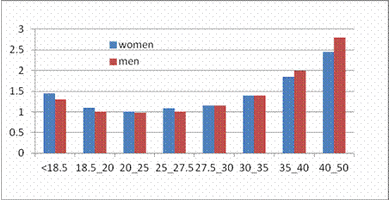|
Being very under-weight or being very over-weight is associated with significantly increased risk of death compared with people of a normal weight.
The following graph (which relates to Caucasians) demonstrates that mortality more than doubles once BMI exceeds 35, and increases with the degree of obesity. Mortality related to severe obesity is higher in men. |
Body Mass Index (BMI) is used as a measure of obesity and is calculated by the formula :
BMI = weight (kg) x height (metres)2.
BMI less than 18.5 underweight
18.5 to 25 normal weight
26 to 30 overweight
30 to 35 mild obesity
35 to 40 moderate obesity
40 or more severe or ‘morbid’ obesity
Click here for the Heart Foundation BMI calculator
Waist circumference is also used as a measure of obesity because abdominal fat is a major factor in causing obesity related disease. A waist circumference of more than 102 cm in men and 88 cm in women is associated with high risk. The incidence of obesity in Australia has more than doubled in the past 20 years!
Obesity is associated with the development of a number of diseases most particularly type 2 diabetes (where obesity is the identifiable cause in two thirds of cases), heart disease, hypertension, sleep apnoea, osteoarthritis and certain cancers. Psychological and social issues are often associated with obesity.
Almost ALL cases of obesity are related to eating too many calories – a reduced exercise lifestyle compounds the problem. The average calorie intake per day, in Australia, has increased by more than 20% for women and around 6% for men in the last 30 years – at the same time physical activity has reduced. A large percentage of the increased calorie intake relates to the increased consumption of sweetened drinks and potato crisps!
REDUCING WEIGHT
The ONLY way to reduce weight is to REDUCE DAILY CALORIE INTAKE by better food and drink selection and reducing portion sizes. Each gram of carbohydrate = 4 calories, protein = 4 calories,
alcohol = 7 calories and fat = 9 calories – fat and alcohol are poor choices!
Increasing activity and exercise will help in weight reduction, by using up more calories, however, it is almost IMPOSSIBLE to significantly reduce weight by exercise alone.
Calorie intake reduction and increased activity has to be a LIFE LONG change to be effective – short term or ‘fad’ diets are almost never effective in the long term as people revert to their old habits very quickly, often ending up heavier than before they undertook the current fad diet.
Daily calorie intake to maintain a constant weight varies with age, gender and daily activity levels. To reduce weight, daily calorie intake must be consistently less than this amount.
The most effective long term weight reduction is achieved by the various forms of gastric surgery and gastric banding – however this is expensive and associated with significant complications.
BMI = weight (kg) x height (metres)2.
BMI less than 18.5 underweight
18.5 to 25 normal weight
26 to 30 overweight
30 to 35 mild obesity
35 to 40 moderate obesity
40 or more severe or ‘morbid’ obesity
Click here for the Heart Foundation BMI calculator
Waist circumference is also used as a measure of obesity because abdominal fat is a major factor in causing obesity related disease. A waist circumference of more than 102 cm in men and 88 cm in women is associated with high risk. The incidence of obesity in Australia has more than doubled in the past 20 years!
Obesity is associated with the development of a number of diseases most particularly type 2 diabetes (where obesity is the identifiable cause in two thirds of cases), heart disease, hypertension, sleep apnoea, osteoarthritis and certain cancers. Psychological and social issues are often associated with obesity.
Almost ALL cases of obesity are related to eating too many calories – a reduced exercise lifestyle compounds the problem. The average calorie intake per day, in Australia, has increased by more than 20% for women and around 6% for men in the last 30 years – at the same time physical activity has reduced. A large percentage of the increased calorie intake relates to the increased consumption of sweetened drinks and potato crisps!
REDUCING WEIGHT
The ONLY way to reduce weight is to REDUCE DAILY CALORIE INTAKE by better food and drink selection and reducing portion sizes. Each gram of carbohydrate = 4 calories, protein = 4 calories,
alcohol = 7 calories and fat = 9 calories – fat and alcohol are poor choices!
Increasing activity and exercise will help in weight reduction, by using up more calories, however, it is almost IMPOSSIBLE to significantly reduce weight by exercise alone.
Calorie intake reduction and increased activity has to be a LIFE LONG change to be effective – short term or ‘fad’ diets are almost never effective in the long term as people revert to their old habits very quickly, often ending up heavier than before they undertook the current fad diet.
Daily calorie intake to maintain a constant weight varies with age, gender and daily activity levels. To reduce weight, daily calorie intake must be consistently less than this amount.
The most effective long term weight reduction is achieved by the various forms of gastric surgery and gastric banding – however this is expensive and associated with significant complications.

